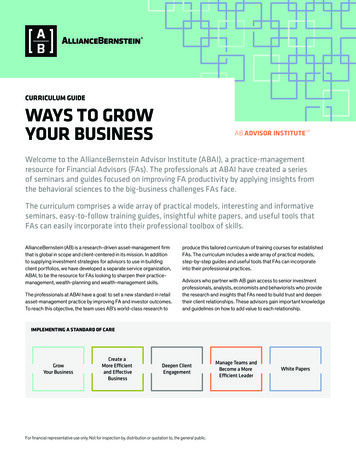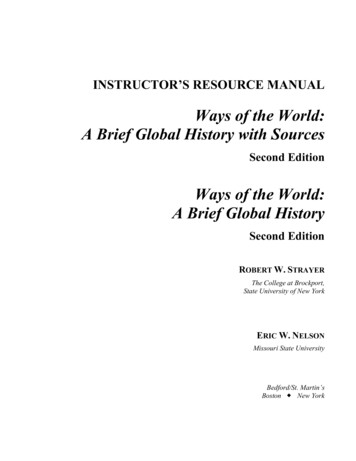
Transcription
10 Ways To AnEffective DivorcebyMary Stearns-MontgomeryContact a Stearns-Montgomery & Proctor Family Law Attorney Today!(678) 905-8492 info@stearns-law.com
10 Ways to an Effective Divorce – 1(678) 905-8492 info@stearns-law.comPart One: Plan AheadBefore getting involved in a divorce, there are severalsteps you can take, as a client, to make the road assmooth as possible. One of the most important thingsto keep in mind is that divorce, like all legalproceedings, requires careful planning. Luckily, thereare some items you can keep in mind while goingthrough the process that can make your dealings withboth the court and your lawyer less burdensome.Divorce can cost significantly more if the process isdrawn out, as every item can become an issue ofcontention. Litigation is the sport of kings. When itcomes to the welfare of your children, there isobviously no price tag. But, when it comes toretirement, the marital home, or other assets, it is bestto think of the division as a business transaction.Simple Ways To Minimize The Cost Of YourDivorce1. Don’t spend a dollar chasing (or protecting) a dime.A simple cost vs. benefit analysis, with the emotionremoved, can truly set the stage for a reasonableoutcome.2. Be sure to be honest and forthright up front.Trying to hide assets, or deplete them before yourspouse figures it out is a guaranteed way to expendmore time and money when the truth of your deceitcomes out. Once you are caught, the judge will likelyorder you to pay the other side’s fees as well.3. Have a clear goal. By working with your attorney,you can get an educated guess as to what the judge islikely to do in a given situation, resulting in a “realitycheck” on the law and the facts. This should help youto make a logical decision on that information, ratherthan simply an argument of “I want it”.
10 Ways to an Effective Divorce – 2(678) 905-8492 info@stearns-law.comPart Two: Your Lawyer Is Your AllyTo continue the discussion on increasing your chanceof a better outcome in a divorce, our focus will shift tothe importance of understanding your lawyer’s role inyour divorce case. Like any other professional, lawyerscan be sued also. Sometimes these cases are justified,as the lawyer did commit an error. Other timesindividual clients are simply dissatisfied with theoutcome of their particular case.As a client, it is essential to maintain an open andhonest relationship with your lawyer. This is the onlyway your lawyer can attempt to accurately assess theprobable outcome of your divorce. Your lawyer isnever the final decision maker in your case.Remember, when you chose to take a settlement,you have agreed to a definitive outcome to thedivorce process.If you go to trial, the judge or jury has the final say.Regardless of the experience and skill of your familylaw attorney, there may be certain outcomes of yourdivorce proceedings that will not result to your liking.Hiring a talented attorney is the best way to proceedintelligently in your divorce. By retaining counsel tohandle the proceedings, you can significantly diminishthe chance that you will be surprised by the outcome.
10 Ways to an Effective Divorce – 3(678) 905-8492 info@stearns-law.comPart Three: Assess Your Financial HoldingsIn the 3rd part of our series, we will discuss theintricacies that may arise from a financial perspectivewhen going through a divorce. Typically, financesfinish a close second behind child custody issues whenit comes to items that are harshly disputed between theparties going through divorce proceedings. It isimperative that you conduct the proper research andarm yourself accordingly. In doing so, you can takesteps towards preventing a potential shortfall resultingfrom your financial settlement.Be Sure To Assess Your Investments AndFinancial HoldingsIt is absolutely vital that you create an extremelythorough list of assets that may come into play duringthe divorce proceedings. These assets may include, butare not limited to, items such as: savings accounts investments retirement assets (401k, 403b, ira accounts) real estate holdings life insurance individual checking accounts collectibles and art vehicles ownership in business entitiesMake Sure You List All Of The Liabilities AsWellSecondly, please do not forget the monies owed byboth parties in the marriage. You certainly do notwant to be unnecessarily burdened with debt if at allpossible. A few examples of debt that you need toassess include: student loans credit card debt mortgagesvehiclesback taxes owedWith the individual creditors, you will need to takedetailed notes that list the name of the creditor, thetotal amount owed, the monthly payment, and mostimportantly, who was responsible for incurring thedebt. The more documentation provided the better.Obtaining copies of all three of your credit reports willensure nothing is left out of the final agreementor judgment.Consult An Expert When Dealing WithFinancial Aspects Of DivorceFinally, please understand that while your attorneyis well versed in the intricacies of financial divorceproceedings, they may not have expertise when itcomes to the individual laws that pertain to each assetand liability class. It is usually a good idea to hire anexpert to access your investments and other assets,as these items can be complex on an individual basis.These experts can also review your liabilities to ensurethat you aren’t burdened with additional financialramifications coming out of your divorce proceedings.If possible, a financial advisor and tax professionalshould be on your short list of people with whom youshould connect.The attorneys at Stearns Montgomery & Proctor haveextensive experience when it comes to issues offinances and divorce. They can point you in the rightdirection to make sure that this aspect of your divorcegoes as smoothly as possible, helping you to come outthe other side ready to start anew.
10 Ways to an Effective Divorce – 4(678) 905-8492 info@stearns-law.comPart Four: The Benefit Of An ExperiencedFamily Law AttorneyHiring a competent attorney with whom you canentrust your case is one of the most critical parts ofplanning your divorce. Since it is common for divorcecases to settle, many attorneys who are generalpractitioners will accept divorce cases. Divorce casescan be complex, and it is beneficial to have an attorneywho is well-versed in that particular field of law. Inaddition, it is usually in your best interest to find outhow many divorce cases the attorney has handledbefore retaining counsel. Even if you believe yourcase will be uncontested, unpredictable events mayunfold. In such cases, a professional who is practicedin handling the twists and turns of family law mayprove invaluable to your case. An attorney whospecializes in family law may be a little bit moreexpensive. However, you are investing in his or herexperience, along with the comfort of knowing thatyour best interest is paramount.Make Sure Your Attorney Specializes InFamily LawPlease keep in mind that, regardless of their experience,no lawyer can make promises as to the final outcomeof your case. The best guidance that is typicallyprovided is a well-educated guess based on experience.The final outcome is dictated by the intricacies of thedivorce filing. Therefore, it stands to reason that anattorney who specializes in the practice of family lawwould be the best individual to evaluate the merits ofyour case. No matter how compelling that case maybe, be wary of any guarantees made by an attorney, andunderstand that experienced lawyers will avoid suchdefinitive language. Finally, listen carefully to all of theinformation that is provided by your attorney, and besure to make no assumptions regarding the outcome ofyour divorce case.
10 Ways to an Effective Divorce – 5(678) 905-8492 info@stearns-law.comPart Five: Alimony And Child SupportAlimony and child support typically tend to make upsome of the more combative issues in divorce cases.Many people wonder how the income(s) that oncesupported a single household will stretch to supporttwo. Issues of finances vary from case to case, whichmakes it all the more important that you are honestwith your lawyer about your financial situation. Thecourt will take such issues into consideration whendeciding amounts for child support and alimony.Determining Child Support In The StateOf GeorgiaIn determining the amount of child support owed,Georgia law takes into account the combined incomeof both parents along with the number of childrenbeing supported. A child support obligation “table” isused to determine the amount of child support to bepaid or received. Because the proper amount iscarefully calculated, it is essential that the courts haveaccurate information regarding each spouse’s incomeand earning potential. For additional informationabout the topic please refer to our library of ChildSupport Resources.Alimony Requirements In The State OfGeorgiaUnlike child support, Georgia has no state requirementsfor alimony. In general, it is intended to take intoaccount the contributions of a spouse who has caredfor the children or supported the careers of theirworking spouse. Alimony is not a right, but in certainsituations it can be awarded, either over time or in alump sum after the divorce. In order to determine theeligibility of a spouse to receive alimony, the court willconsider the needs, income, and assets of each spouse.Typically, alimony is not awarded in situations whereboth spouses worked during the marriage and can support themselves. For more about alimony in the stateof Georgia please visit our section on Alimony andSpousal Support.Whether you feel as you are deserving of suchsupport payments, or think that your ex-spouse isunduly asking for them, it is always a benefit to havean experienced Family Law Attorney on your side.
10 Ways to an Effective Divorce – 6(678) 905-8492 info@stearns-law.comPart Six: Understanding The Divorce ProcessIn GeorgiaFiling for a divorce in the state of Georgia has arelatively routine set of actions. However, many clientswho are seeking a Georgia divorce do not have a firmgrasp on what to expect with the proceedings. As a result,it is extremely important that a potential divorceeunderstands the routine steps to complete the process.Divorce In Georgia: The Petition &ObjectivesFirst and foremost, keep in mind that you must havebeen a resident of Georgia for six months before youcan file a “Petition for Divorce.”Filing a Petition for Divorce at the appropriate countycourt is usually the first step of the divorce process inGeorgia. The petition displays the reason, or grounds,for the divorce filing, and also discusses how theperson filing would like to handle issues such as childcustody, alimony, and division of assets.The petition is then “served” upon the other spouse,and he or she must respond to the document within30 days. The individual receiving the divorce requestcan either accept the terms of the divorce, object to thereasoning behind the filing, or can agree to the divorce,but object to the grounds. At this time, depending onthe initial outcome, the court can impose “TemporaryDivorce Orders” which outlines rules during theimpending divorce procedures.The Divorce Discovery Process & MediationIf an amicable solution is not agreed upon, the partiesinvolved will go through the discovery process. Thisstep is when the opposing parties gather informationabout each other, and lay the evidence to show thefoundation for what they are seeking by way of thedivision of assets, child custody, and support agreements.At this time, the parties involved have the opportunityto undergo the “mediation” process. This process iswhere they will examine all of the evidence that hasbeen gathered, and come to an amicable solutionthat is satisfactory to both parties. If no agreement isreached, the case will then go to divorce court.Divorce Court In GeorgiaDuring the divorce trial, all of the evidence will bepresented by the parties, and examined by an appointedjudge or jury. After hearing the opposing arguments,the judge or jury will decide on a proper divorcesettlement, and mandate that both parties adhere tothis decision.If you feel that the court was not fair in its decision,you do have the option and right to file a motion to askthe court to reconsider or for a new trial. This motionis filed with the same presiding judge that heard theoriginal arguments, and he or she will either grant ordeny your motion. You also have the right to file anappeal to another court.
10 Ways to an Effective Divorce – 7(678) 905-8492 info@stearns-law.comPart Seven: Property Division In GeorgiaThe division of household property is one of the mostimportant items that are addressed during divorceproceedings in the state of Georgia. Often, the contestedproperty and assets have been accumulated over along period of time, and may contain complexities thatdon’t make them easily divisible. Let’s discuss the twomajor guidelines regarding property division during adivorce in Georgia, and how you could be affected asa result.Georgia Divorce And Equitable DivisionEquitable division is the most common method thatis used in Georgia when determining how householdassets will be divided during a divorce. When thecouple’s assets are split, there will need to be aninventory of all the assets that were acquired duringthe marriage, and the courts will then divide it onan equitable basis, which means whatever the Courtthinks is fair. It is a very broad standard and therereally are no clear cut guidelines. However, most cases,not all, will easily settle if the parties agree to split theassets 50/50.The bottom line is that if property or assets areacquired during the marriage, they will likely beconsidered marital property. Examples of maritalproperty that are typically considered for equitabledivision include: salary earned retirement plan assets joint or separate checking or savings automobiles homespetscredit card debtsgifts to and from the spousesAlimony In GeorgiaAnother way that a spouse can be made whole as partof the divorce decree is when alimony comes into play.Alimony is a payment that is stipulated by the courtsto a spouse as the result of a divorce decree. Typically,this method of making the spouse whole comes from asituation where the other person is the breadwinnerand has the responsibility of supporting the familyduring the marriage. As a result, the payee receivesthe income in order to maintain a certain standard ofliving after the divorce.In this situation, the spouse receiving alimony receivesthe income, and it is generally considered to be taxableas if they were receiving wages. In turn, the alimonypayment may be deductible to the payor as an expense.
10 Ways to an Effective Divorce – 8(678) 905-8492 info@stearns-law.comPart Eight: Understanding The Benefits OfMediation In GeorgiaIt goes without saying that a divorce can be anextremely messy, and emotionally draining process.Besides the parties directly involved, it can leave alasting impact on children, friends, and additionalfamily members who may feel as if they are forced totake sides when dealing with the issue.However, did you know that there are alternatives forgoing through the lengthy and often arduous processof litigation? Let’s discuss the concept of mediationin Georgia, what it entails, and how this may providea much better solution for all parties involved whenmoving towards a permanent separation.Mediation works by hiring a neutral 3rd party to actas an in-between with the individuals involved. Afterlistening to both sides, and details about the case, themediator will offer independent advice and solutionsthat adequately address the concerns and needs of bothparties. They are encouraged to work together to find acommon solution, as opposed to vehemently fightingeach other in the court system. This tends to set thegroundwork for agreement on a mutually satisfactorydivorce decree, as there is usually quite a bit of overlapin their needs.Mediation For Your Divorce May Be WorthExploringHow Does Divorce Mediation In The State Of Mediations tend to provide divorcing couples withGeorgia Work?a cleaner solution, so it is something that should beDivorce mediation in the state of Georgia is a processwhere the parties involved get together to try to findcommon ground about the details of the divorce beforegoing before a judge. The couple will discuss potentialsolutions to common subjects pertaining to divorcesuch as annulment, child custody, paternity rights, andchild or spousal support. Mediation can be extremelybeneficial to the divorcees, as it can provide solutionsthat are mutually agreed upon before relying on ajudge to issue a ruling on the case.considered. Generally speaking, statistics have shownthat mediation results in better relationships after theprocess for the parties involved. Most importantly, thistends to hold especially true for the children, since itcircumvents a potentially ugly fight in court.The attorneys at Stearns-Montgomery and Proctorhave extensive experience in the mediation processin the state of Georgia. To explore your options formediation, please contact one of our attorneys today.
10 Ways to an Effective Divorce – 9(678) 905-8492 info@stearns-law.comPart Nine: Who Pays Taxes In A Divorce?If you’re currently going through a divorce orseparation, the outcome of the process can drasticallychange your financial and tax status. Each spouse’ssituation changes, depending on the structure of thedivorce settlement. Also, the parties need to beaware their potential filing status will be affected by thepending divorce. Planning ahead for these potentialland mines is critical.Couples must file as single if the couple is legallydivorced and living apart before New Year’s Eve. Ifeither spouse maintains a home for the minor childrenand can’t file a joint return for the year, you can file as“Head of Household” and get the benefit of a biggerstandard deduction. To qualify as Head of Householdstatus, there are several conditions and requirementswhich must be met.Common Questions About Taxes AndDivorceThe IRS governs when it comes to tax liability forproperty of the parties and payments includingalimony and child support. With regards to alimony,the IRS won’t consider the payments as deductibleunless certain stipulations and conditions are met withinthe property settlement agreement or court order.The couple’s filing status for tax purposes is determinedas of the last day of the tax year. If the divorce is stillpending, be aware the IRS does not require that theparties file a joint tax return. Along the same lines, astate court judge has no authority to order the partiesto file a joint tax return. One party or the other mayunilaterally make the decision not to file a joint taxreturn. This can substantially impact the other party’stax liability.
10 Ways to an Effective Divorce – 10(678) 905-8492 info@stearns-law.comPart Ten: What Happens At The End OfA Divorce?In our series,“10 Ways to an Effective Divorce,” weexplained the divorce process in the state of Georgiaand answered tough questions about paying for thedivorce, hiring an experienced family law attorney,important factors to consider when filing, assessingalimony and child support, using mediation effectively,determining equitable property division, and protectingimportant parental rights. We conclude our serieswith a brief discussion of what happens at the end ofa divorce.In most cases, the divorce process concludes when ajudge signs a Decree of Divorce. Before doing so,all the terms of the divorce must be decided andincorporated into a settlement agreement or a courtorder if an agreement cannot be reached. Georgialaw requires a parenting plan and child supportarrangement for all cases involving children underthe age of 18. The parenting plan must include, amongother things, the allocation of physical custody andidentify how p
Mary Stearns-Montgomery Contact a Stearns-Montgomery & Proctor Family Law Attorney Today! (678) 905-8492 info@stearns-law.com. 10 Ways to an Efective Divorce – 1 (678) 905-8492 info@stearns-law.co











